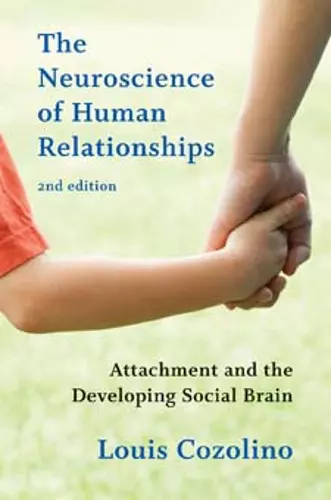The Neuroscience of Human Relationships
Attachment and the Developing Social Brain
Format:Hardback
Publisher:WW Norton & Co
Published:24th Mar '14
Should be back in stock very soon

As human beings, we cherish our individuality yet we know that we live in constant relationship to others, and that other people play a significant part in regulating our emotional and social behavior. Although this interdependence is a reality of our existence, we are just beginning to understand that we have evolved as social creatures with interwoven brains and biologies. The human brain itself is a social organ and to truly understand being human, we must understand not only how we as whole people exist with others, but how our brains, themselves, exist in relationship to other brains. The first edition of this book tackled these important questions of interpersonal neurobiology—that the brain is a social organ built through experience—using poignant case examples from the author’s years of clinical experience. Brain drawings and elegant explanations of social neuroscience wove together emerging findings from the research literature to bring neuroscience to the stories of our lives. Since the publication of the first edition in 2006, the field of social neuroscience has grown at a mind-numbing pace. Technical advances now provide more windows into our inner neural universe and terms like attachment, empathy, compassion, and mindfulness have begun to appear in the scientific literature. Overall, there has been a deepening appreciation for the essential interdependence of brain and mind. More and more parents, teachers, and therapists are asking how brains develop, grow, connect, learn, and heal. The new edition of this book organizes this cutting-edge, abundant research and presents its compelling insights, reflecting a host of significant developments in social neuroscience. Our understanding of mirror neurons and their significance to human relationships has continued to expand and deepen and is discussed here. Additionally, this edition reflects the gradual shift in focus from individual brain structures to functional neural systems—an important and necessary step forward. A great deal of neural overlap has been discovered in brain activation when we are thinking about others and ourselves. This raises many questions including how we come to know others and whether the notion of an “individual self” is anything more than an evolutionary strategy to support our interconnection. In short, we are just beginning to see the larger implications of all neurological processes—how the architecture of the brain can help us...
"[F]ascinating . . . . The narratives provided are helpful in understanding the application of neuroscience in the clinical setting. The reader will certainly come away with a "deeper appreciation of the complexity and importance of our interactions with others, especially those closest to us" (xv)." -- Somatic Psychotherapy Today
"[R]emarkable book . . . . Cozolino not only provides valuable insights for treating old wounds, but, much more importantly, he describes the kind of nurturing social environments that can prevent such damage in the first place." -- Association for Prenatal and Perinatal Psychology And Health
"I had barely started this book and was already recommending it to friends and colleagues. . . . I have been using Cozolino’s wisdom and work both for my clients and myself since reading this book. The breadth of empirical knowledge and wisdom it contains is phenomenal. . . . And due to Cozolino’s emphasis on attachment theory and development of the mind — including how he uses neuroscience and attachment theory in helping clients to change — I would recommend his work to parents as well." -- Psych Central
ISBN: 9780393707823
Dimensions: 244mm x 165mm x 43mm
Weight: 1075g
656 pages
Second Edition